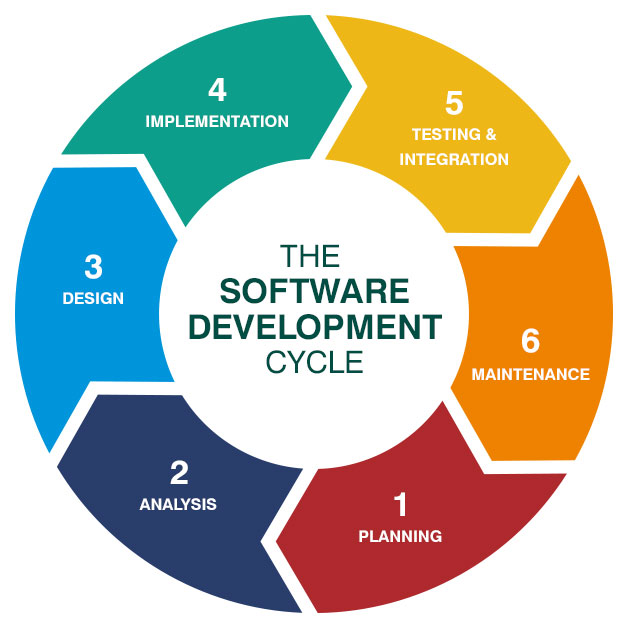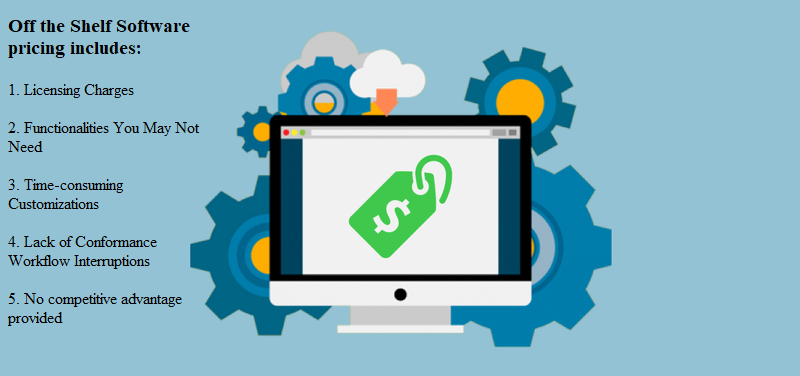Which to choose: Custom Development or Off the Shelf Software
In the world market, there is a vast range of software products. Custom software development aims to meet a specific set of requirements. Off-the-shelf software addresses a wide range of conditions. It enables it to be bundled, marketed, and distributed.
A company’s efficiency can be harmed if the wrong solution is selected. In this case, it is both time and money. First, you must determine the requirements of your software package. After you’ve chosen your needs, decide whether to buy them or not.
Yet, you must conduct extensive research to comprehend the out-of-the-box solution. It will help you with all its requirements.

What is Custom Development?
The idea of developing software applications is to address the needs of an entity or a company. This detailed process is known as custom software development. Custom opportunities, as opposed to commercial off-the-shelf (COTS) software, allow you to solve problems. They are also intended for internal use only, not for selling.
Custom development involves either the creation of a new app or enhancing the features of existing software. It can be completed by either internal or externally outsourced developers.
Custom Software Product: Development Process
The secret to a good custom software project is ensuring that software is required rather than purchasing a packaged solution. There must be a valid reason to be sure in this case.

Custom products are handled by in-house developers or subcontracted to a foreign entity. It follows the same techniques and systems as other kinds of software development. A custom project follows the same procedures as other software, including:
- Needs analysis
- Coding
- Testing
- And implementation
Advantages and Disadvantages of Custom Software
Determining whether your company requires custom software development can be challenging. Before deciding, you need to understand the benefits and drawbacks of Custom Software Development.
The advantages of custom software are:
- Tailor-made Option
- Return on Investment
- Security (With custom software, opportunities of intrusion are significantly lowered)
- Larger Scalability
- Interoperability
- Easy to Operate
- Enhanced Software Support
- Competitiveness
The following are the disadvantages of custom software:
- Strong investment
- Time required
- Custom software can restrict business
- Dynamism and continual technology advancements
Who should use Custom Software?
Use it when ready-made software fail to suit your requirements. When the customer’s perceptions are not met, constructing custom software solutions helps a lot.
Custom software is explained as the method of designing, building, retaining, and advancing. After that, the software is unique to your company and accurately tailored to your requirements. It can provide you with what you need to offer benefits to your business.
You should undertake business to help your customers’ lives better in the long run. Custom software, in particular, can assist you in accomplishing this. Many businesses use customized software development for most of their methods, such as:
- Content management
- Inventory control
- And CRM

We have a quick overview to help you determine whether you need custom software. You need to determine whether custom software is appropriate for your business needs. Organizations can check for the following questions:
- Is it necessary for the company to make any changes to its operations?
- Do you need many programs to perform different stages of the same process?
- Is it necessary to have tools that can incorporate with other structures?
- Does the company have business processes that require unique functionality?
- What are the anticipated benefits of software?
- Is among the goals of the software developed to be the simplicity of use?
- Is the software application causing problems for employees, customers, and vendors?
If you encounter most of the responses as ‘yes,’ then your company requires custom software.
Every business is distinct. It is the result of a combination of people, process, placement, and many other variables. And, in our expertise, you can’t look to encounter software that fits every aspect of your business.
Custom software is appropriate for you if you meet the following criteria:
- You’ve personalized your data with non-standard data sets
- Your procedures are distinctive and must be digitized
- Your business plan is unique and must be maintained to give you an advantage.
- What are the indications that your company requires custom software development?
- The software’s compatibility with the specific features of your business is highlighted.
- Your existing software is insufficient. Your IT infrastructure requires an upgrade.
- You continue to waste time on manual methods rather than automating them.
- You believe that technology has abandoned you. Further, there are no proper turn-key remedies in your sector.
- You use many ready made computer software to protect all business operations.
- You intend to expand your company’s operations.
Cost of Custom Software
There is no specific calculation method the exact cost of custom software. Instead, several factors combine to calculate the price of tailor-made software development.
Custom software is costly because it is developed to meet specific needs. Further, it requires a lot of time and commitment. Though they are more expensive, they are generally work longer. Because it is intended for a current process, it saves time and money on coaching the staff members.

Several factors influence custom software development cost:
- The difficulty of developing your software
- The size of your project
- The Type of Design You Want
- Connecting with other systems
- Transferring existing data
- The Delivery Time Span
If custom software is more suitable for your case, you should follow the development process described in this article:
MVP-app Development for Startups – 7 Steps to Avoid Mistakes
Examples of Custom Software
Custom software offers a more specialized software solution tailored to project specifications. It has become a need for the most important and fastest-growing industries. Custom software examples are:
- Google employs a programmable search tool as part of its business procedures.
- Amazon and eBay
- Lifeguard Mobile App
- YouTube
- Netflix
What is Off the shelf Software?
Off the shelf software is developed for public use rather than for individuals. Because it is used for development purposes, the software modules are designed so that anyone can use any specific module. For example, if you only need an accounting module, it can be tailored to your specifications.

These products are intended to be integrated into current systems. There is no need for customizability. Office suites, email clients, warehouses, and accounting software are a few examples.
COTS addresses a wide range of requirements. It will enable it to be packaged, marketed, and dispersed.
Pros and Cons of Off the Shelf Software
Ready-made software provides organizations with several key benefits, making it an appealing alternative. Yet, it could also reveal significant disadvantages.
Benefits of Off the Shelf Software are:
- Cost-efficient
- Off the Shelf Software is available ready-to-use
- A team of professional developers establishes readymade software
- Easy to use
- Quick to Incorporate
- There are Pre-Existing alternatives
- Could offer you more Functionalities
- Updates are all included
Disadvantages of Using off-the-shelf software are as follows:
- Can charge you more in the long run
- The product that is inflexible and may be impossible to reverse
- Complexity
- Overloaded Functionality
- Problems with compatibility
- It might not be appropriate for your working practices.
Who should use Off the Shelf Software?
As it is a Ready made software item, off-the-shelf software is recommended for startups. Off the shelf software is critical for new companies, startups, and cautious companies transitioning who are starting to take a digital approach. Investing in your item while business processes are being established is risky.

In general, the readymade alternative enables a company to meet all of its necessities. It will optimize routine activities, and save money. This option is also appealing because it can be rapidly and effortlessly set up even without the assistance of IT professionals.
If you only intend to use it within your corporation, the available solution may be sufficient.
As a rule, Off the Shelf Software is provided for use according to the SaaS business model, read more: “All You Need To Know about SaaS”
Cost of Off the Shelf Software
Off-the-shelf software is usually less expensive than custom software. You only have to pay a one-time fee to begin using it. This is because the actual cost of establishing and running the software is being spread across a much bigger user base. Because more folks are using it and reimbursing it, the software seller can charge a different fee for the initial installation.
Some off-the-shelf providers offer to customize their software to your necessities as they establish it. After that they will charge exorbitant fees to do so. The safe “buy” alternative can accumulate a depressing list of hidden charges, such as:
- Licensing Charges
- Functionalities You May Not Need
- Time-consuming Customizations
- Lack of Conformance Workflow Interruptions
- No competitive advantage provided

Examples of Off the shelf Software
Off-the-shelf software consists of applications designed for a broad audience. Their ease of use and accessibility distinguishes them.
- FIFA, Call of Duty, and Angry Birds are examples of video games.
- Gmail и Microsoft Office
- VLC and Windows Media Player are two examples of media players.
Enhanced Customer Relationship Management (CRM) software such as:
- Salesforce CRM
- HubSpot CRM
- And Zoho CRM
- These are all prepared consumer CRM suites.
Conclusion
When deciding between commercial and custom software, consider all of its possible factors. Check your business’ needs and the long-term implications of both choices. Each type of business automation has benefits and drawbacks. Ultimately, you will get control over your business. It all varies depending on your specific wants and tastes.
If you are still not sure about the path to take, please contact us for technical help. OSSystem’s professionals will discuss your custom software project according to your business needs. The final software product will move your business to the next level.

Subscribe to us










